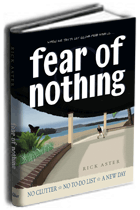Effective clutter-busting may depend on taking some time to put yourself in the right frame of mind first. Since today is the first day of March of Trash 2016, it seemed the perfect time to look at this subject. Most of all, be patient getting started with clutter, since getting started is often the biggest hurdle for a person to get over.
March 01, 2016
February 29, 2016
Introducing the March of Trash Challenge
Join forces with 100-200 other every-day-clutter-busters for the March of Trash challenge. Again this year, the challenge is to throw junk away every day for the entire month of March. Read all about it and download your scorecard here:
February 20, 2016
March of Trash Starts in Ten Days
Space is freedom. With space to work in, you can do the work to make the changes that transform the limiting circumstances of your life into something quite different. Work creates change. Space makes work possible. So where does the space come from?
If you’re like most people, space is the result of taking a careful look at your possessions and making a series of difficult decisions — a process otherwise known as clutter-busting. The hundred or so participants in this year’s March of Trash are setting aside a small amount of time every day in March to clear the decks and create the space for whatever comes next.
March of Trash is in March to provide an early start on spring cleaning. Cleaning a room isn’t half as hard if you can take the clutter away first. Spring cleaning doesn’t have to be so daunting if you divide it into two stages — first, take away the junk and clutter, then take away the dirt and dust. March of Trash helps you focus on the junk and clutter.
February 05, 2016
Multitasking: More Harmful Than Previously Thought
We’ve all heard by now that multitasking doesn’t really work and can be harmful. I know there are people who are carrying on with their multitasking habits, hoping that brain scientists will change their minds and decide that rapid task-switching isn’t really as harmful as it appeared a year or two ago. Unfortunately, the evidence against multitasking continues to accumulate. If you habitually try to do three or four things at once, you must change your approach as soon as you can so that you can be healthier and get more done. In case you’re not convinced, here’s the latest roundup of what is known about multitasking:
December 30, 2015
End-of-Year Leave-Behind Ritual
A successful new year is not just a matter of starting new things, but also of leaving old things behind. This can include physical decluttering, throwing away unneeded materials from a project that was completed or abandoned sometime during the year. It also extends to more spiritual matters, which at the most basic level can mean wanting to stop worrying about problems that were substantially resolved in the old year.
At 1 p.m. ET on New Year’s Eve I will be doing a ritual to leave behind the unwanted problems of 2015, not just my own but those of the community and world as well. If you want me to include any problem you got tired of seeing in 2015, let me know by commenting here or on Twitter using the hashtag #leavebehindin2015.
November 03, 2015
How Advertising Creates Overconsumption
Not everyone notices the role of advertising in creating clutter. It takes an marketing expert to point out how vulnerable people are to advertising messages that create links between our emotional needs and shopping desires. Former advertising writer Greg Foyster puts it this way:
This is now advertising’s role in the economy – to convince people that nonmaterial happiness can be gained through material belongings.
Desires for material things have limits – most people really only want or need one dishwasher, or one or two cars – but desire for emotional needs like status, love, acceptance and autonomy are bottomless. Tying material goods to nonmaterial desires ensures people are never satisfied with what they have. It’s how we’ve convinced some of the most materially rich citizens in history that they don’t have enough.
Read the whole story at The Guardian:
June 13, 2015
Why To-Do Lists and Clutter Don’t Mix
The book Fear of Nothing makes the bold promise of “no clutter” and “no to-do list.” This promise is only half as big as it appears. That’s because you probably don’t have both clutter and a to-do list at the same time, even though it sometimes appears that you do.
It is virtually impossible to be living with clutter and work your way through a to-do list. If you have enough clutter that it gets in the way sometimes, then your to-do list can’t proceed the way it’s intended. With clutter, a to-do list is little more than wishful thinking. Conversely, if you have a to-do list and work through it item by item, that means you didn’t run into much clutter along the way. If a to-do list is effective, it shows that you have been able to remove yourself from clutter, at least for the day.
June 03, 2015
The Junkyard Life
No one would want to live in a junkyard – but homes resemble junkyards and junkyards resemble homes more closely than we would care to admit.
I had a chance to think about this last week when I visited a junkyard. I drove in with an old car that will be sold on as scrap metal. I had a moment to look around while I was there. When you look at the way it really works, a junkyard is not quite what culture and literature tell us it is.


